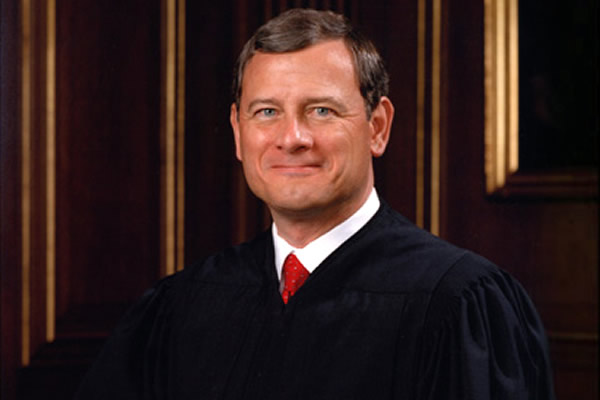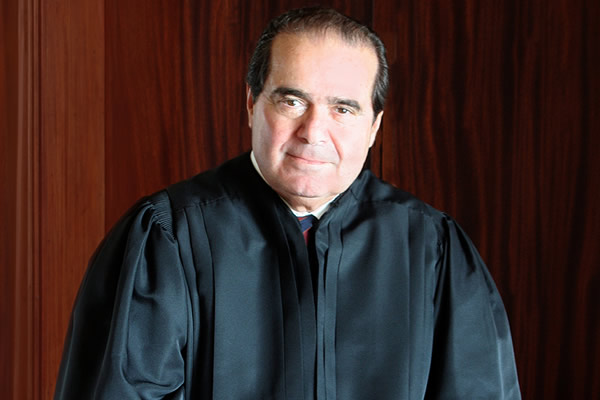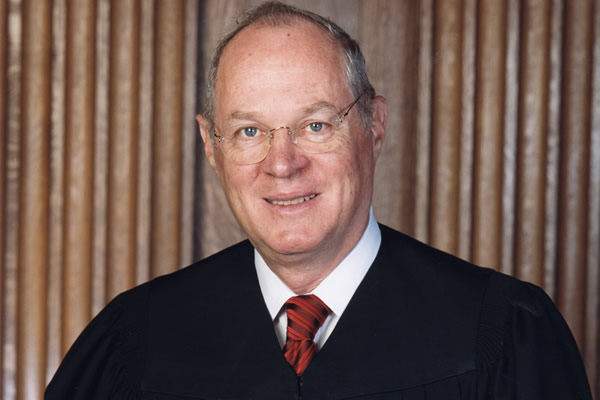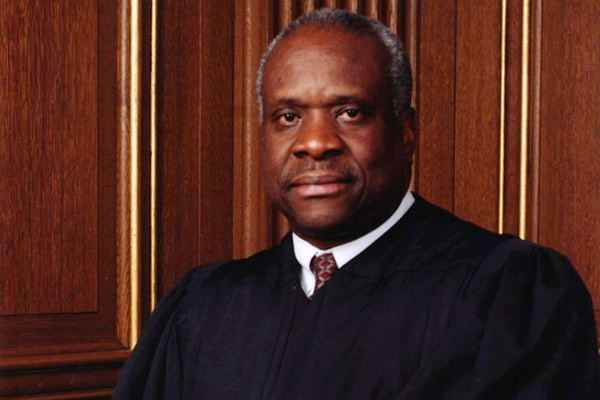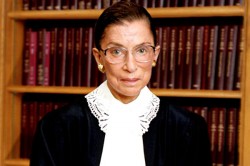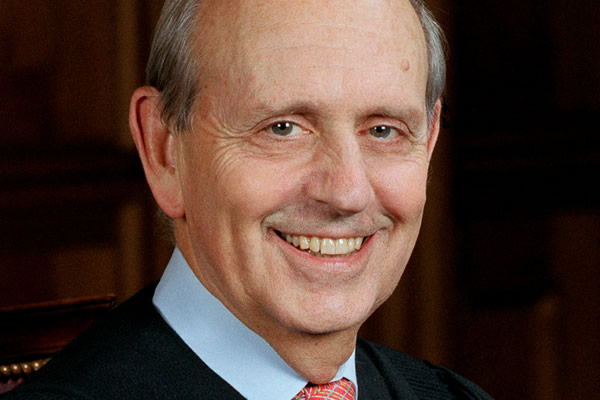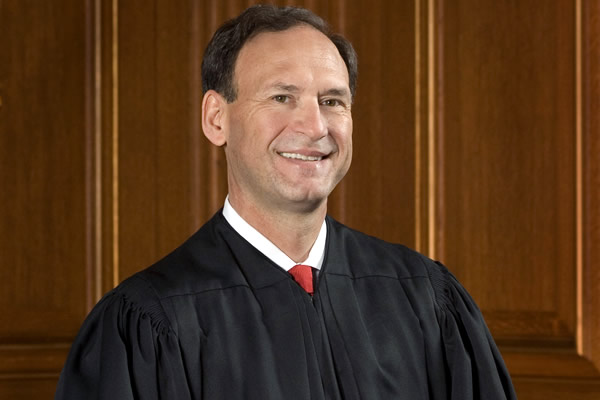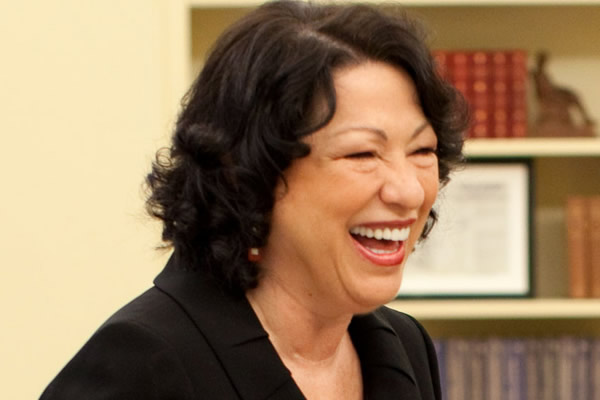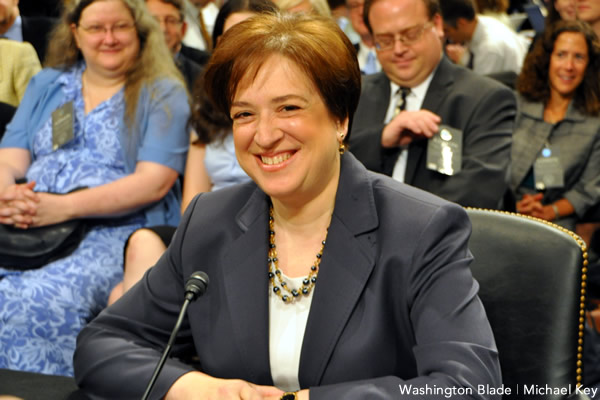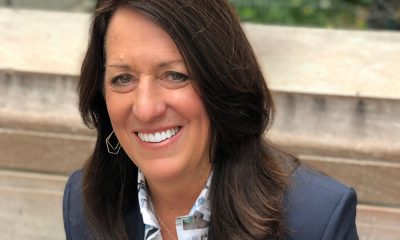National
How will Supreme Court rule on marriage?
Parsing statements, records for hints as to how justices will decide DOMA, Prop 8 cases
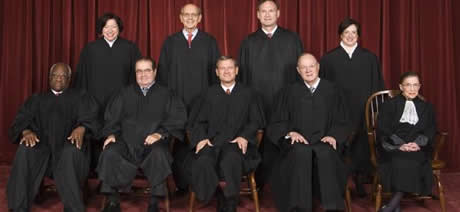
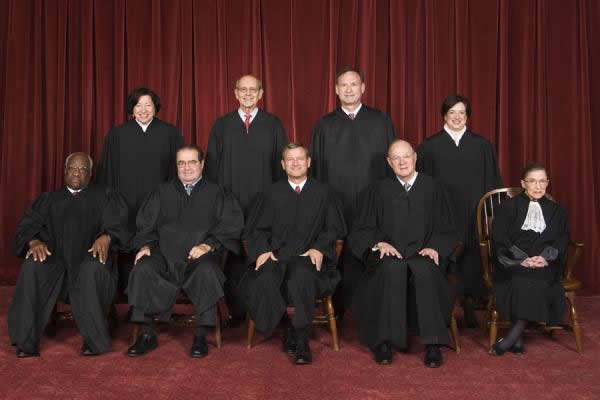
Justices on the U.S. Supreme Court are expected to issue rulings on the Prop 8 and DOMA cases in June. (Photo public domain)
The nine members of the U.S. Supreme Court are expected to reach a decision by the end of June in two high-profile LGBT rights cases on which they heard oral arguments last week challenging California’s Proposition 8 and the federal Defense of Marriage Act.
The justices could reach any number of decisions on either or both of the cases — upholding the anti-gay measures, dismissing the cases for lack of standing or jurisdiction, striking down Prop 8 and DOMA on grounds they violate the rights of same-sex couples under the U.S. Constitution — or even issuing a national ruling in favor of marriage equality.
Predicting how they might rule is tricky. But several of the justices made statements and asked questions during the oral arguments that offered some hints. Perhaps more significantly, many of them have a record of ruling in gay rights cases that might indicate their leanings on marriage. The Washington Blade has compiled profiles of the justices to assess how they might rule in the two marriage cases before them.
In addition to examining their comments during the arguments, the Blade has looked at how they ruled in other high-profile gay rights cases. One is the 1996 case of Romer v. Evans in which the Supreme Court struck down Colorado’s Amendment 2, which would have prohibited municipalities from passing non-discrimination ordinances protecting LGBT people. Another is the 2003 case of Lawrence v. Texas in which the Supreme Court struck down state sodomy laws.
The Blade also looked at the court ruling in the 2010 case of Christian Legal Society v. Martinez. In that case, the court upheld the Hastings College of Law’s non-discrimination policy against a challenge from Hastings Christian Fellowship, which sought to overturn the policy to maintain its status as an official school group while prohibiting LGBT people from holding positions as officers.
1. Chief Justice John Roberts
The chief justice of the Supreme Court seemed skeptical during oral arguments that Prop 8 and DOMA should be struck down as unconstitutional. He also seemed dismissive of the notion that LGBT people lack political power.
In an exchange with attorney Robbie Kaplan, Chief Justice John Roberts disputed that gay people lack political power — a characteristic that the court has considered in weighing whether a group should be considered a suspect class.
“As far as I can tell, political figures are falling over themselves to endorse your side of the case,” Roberts said.
The chief justice was likely referring to the trend of U.S. senators announcing their support for marriage equality, which just this week added Sens. Bob Casey (D-Pa.), Tom Carper (D-Del.) and Mark Kirk (R-Ill.). When Kaplan pointed out that no group has been subject to referenda in recent years like gay people, Roberts seemed unmoved.
“You just referred to a sea change in people’s understandings and values from 1996, when DOMA was enacted, and I’m just trying to see where that comes from, if not from the political effectiveness of groups on your side,” Roberts said.
Roberts, who was appointed by President George W. Bush, hasn’t ruled on many gay rights cases during his time on the bench. Still, Roberts ruled as part of the dissent that deemed exclusion of LGBT students was acceptable in the Christian Legal Society case.
On the other hand, Roberts in 1996 helped gay rights activists as part of his law firm’s pro bono work in preparation for the Romer case. He also has a lesbian cousin, Jean Podrasky, who attended arguments on Prop 8.
Suzanne Goldberg, a lesbian and co-director of Columbia University’s Center for Gender & Sexuality Law, pointed to another comment Roberts made indicating a parent forcing a child to make friends with another child changes the definition of friendship.
“It suggested that he might be less open to recognizing marriage rights for same-sex couples than the Olson-Boies team had anticipated,” Goldberg said.
2. Associate Justice Antonin Scalia
Associate Justice Antonin Scalia, viewed by many as the most anti-gay of the justices, mused that being raised by gay parents may not be good for a child — an argument made by many anti-gay groups.
“If you redefine marriage to include same-sex couples, you must permit adoption by same-sex couples, and there’s considerable disagreement among sociologists as to what the consequences of raising a child in a single-sex family, whether that is harmful to the child or not,” Scalia said. “Some states do not permit adoption by same-sex couples for that reason.”
Those words are consistent with anti-gay views that Scalia has expressed in the past. Most notably, speaking at Princeton in December, Scalia compared bans on sodomy to laws against murder, saying, “If we cannot have moral feelings against homosexuality, can we have it against murder? Can we have it against other things?”
Since his confirmation to the court, Scalia has not only made anti-gay rulings, but has taken the lead on the opinions. The Reagan-appointed justice wrote the dissenting opinions in the Romer and Lawrence cases and joined with other dissenting justices in ruling for LGBT exclusion in the Christian Legal Society case.
Doug NeJaime, who’s gay and a professor at Loyola Law School, said Scalia is likely to rule to uphold Prop 8 and the Defense of Marriage Act.
“Justice Scalia has made clear in earlier opinions … that legislation can be justified merely by moral disapproval of homosexuality, even though a majority of the court has rejected that position,” NeJaime said. “Moreover, under his theory of constitutional interpretation, he does not believe that lesbians and gay men have a constitutional basis for their claims in these cases.”
3. Associate Justice Anthony Kennedy
The justice who’s being most closely watched because of his reputation for being a swing vote — and his previous rulings in favor of gay rights — conveyed mixed sentiments during the arguments.
Associate Justice Anthony Kennedy contemplated the effect that overturning or sustaining Prop 8 would have on children based on the newness of same-sex marriage.
“We have five years of information to weigh against 2,000 years of history or more,” Kennedy said. “On the other hand, there is … what could be a legal injury, and that’s the voice of these children. There are some 40,000 children in California … that live with same-sex parents, and they want their parents to have full recognition and full status.”
A Reagan appointee, Kennedy authored the majority opinions in the Romer and Lawrence cases that struck down anti-gay measures in those lawsuits. In the Christian Legal Society case, Kennedy also ruled in favor of requiring student groups to be open to all students regardless of LGBT status.
That’s what makes Kennedy’s comment questioning the Ninth Circuit ruling against Prop 8, which was largely based on his opinion in Romer, particularly noteworthy.
“The rationale of the Ninth Circuit was much more narrow,” Kennedy said. “It basically said that California, which has been more generous, more open to protecting same-sex couples than almost any state in the union, just didn’t go far enough, and it’s being penalized for not going far enough. That’s a very odd rationale on which to sustain this opinion.”
Nan Hunter, a lesbian law professor at Georgetown University, said the “single most powerful vibe” she received from Kennedy during arguments was his ambivalence.
“My best guess is that in the Perry case, he will rule in some way that avoids discussion of Prop 8’s constitutionality and that in the Windsor case, he will conclude that DOMA is unconstitutional, but his opinion may invoke federalism as much as it does the Equal Protection Clause,” Hunter said.
4. Associate Justice Clarence Thomas
In accordance with his custom, Associate Justice Clarence Thomas remained silent for the duration of oral arguments in the marriage cases.
Thomas is known for not asking questions. In January, after seven years of silence, the George H.W. Bush-appointed justice made news when he broke his tradition and cracked a joke about the competency of an attorney during a case unrelated to marriage.
But Thomas has a history of taking the anti-gay side. He ruled in the dissent in the Romer and Lawrence cases and ruled for LGBT exclusion in the Christian Legal Society case.
Chris Stoll, a senior staff attorney for the National Center for Lesbian Rights, said oral arguments don’t offer any information on how Thomas might rule, but noted the justice’s history of anti-gay opinions.
“He is quite conservative and historically has voted with the other conservative justices in cases involving LGBT equality,” Stoll said.
5. Associate Justice Ruth Bader Ginsburg
One justice who has a history of ruling in favor of gay rights indicated a disdain for DOMA during oral arguments.
Associate Justice Ruth Bader Ginsburg said the 1996 law creates two different kinds of unions for same-sex and opposite-sex couples: “the full marriage, and then this sort of skim milk marriage.”
While questioning attorney Paul Clement, Ginsburg more distinctly articulated the problems for gay couples under DOMA by enumerating benefits denied to them under the law.
“The problem is if we are totally for the states’ decision that there is a marriage between two people, for the federal government then to come in to say no joint return, no marital deduction, no Social Security benefits; your spouse is very sick but you can’t get leave; people — if that set of attributes, one might well ask, what kind of marriage is this?” Ginsburg said.
Ginsburg also has a history suggesting she’d be willing to rule against Prop 8 and DOMA. The Clinton-appointed justice ruled in favor of LGBT advocates in the Romer, Lawrence and Christian Legal Society cases. Prior to her confirmation as a Supreme Court justice, Ginsburg was a women’s rights advocate and co-founder of the women’s rights project at the American Civil Liberties Union.
David Gans, civil rights director for the progressive Constitutional Accountability Center, said he considers Ginsburg a likely vote to strike down DOMA and Prop 8 based on her history of rulings and comments made in court.
“I think her comments tended to be across the board very skeptical of the justifications offered, and, of course, her record, both as an advocate and justice is to honor the constitutional guarantee of equal protection applies to all persons,” Gans said.
6. Associate Justice Stephen Breyer
The other Clinton appointee on the bench also made comments during the Prop 8 arguments suggesting he might rule in favor of marriage rights for gay couples.
Associate Justice Stephen Breyer was dismissive of Cooper’s assertion that marriage is for procreation, observing California allows straight couples who cannot have children to marry.
“What precisely is the way in which allowing gay couples to marry would interfere with the vision of marriage as procreation of children that allowing sterile couples of different sexes to marry would not?” Breyer said. “I mean, there are lots of people who get married who can’t have children.”
And Breyer’s earlier rulings suggest he would be amenable to striking down Prop 8 and DOMA. Breyer joined Kennedy and other justices in the pro-gay rulings for Romer and Lawrence and sided with LGBT inclusion in the Christian Legal Society Case.
Gans said Breyer’s comments during the Prop 8 arguments indicate his rulings on the anti-gay measures will likely be consistent with his earlier decisions.
“Justice Breyer’s questions during oral argument suggested that he would find that discriminatory marriage laws violate the constitutional guarantee of equal protection for all persons,” Gans said.
7. Associate Justice Samuel Alito
Associate Justice Samuel Alito expressed concerns about same-sex marriage, quipping that it’s “newer than cell phones or the Internet.”
“Same-sex marriage is very new,” Alito said. “I think it was first adopted in the Netherlands in 2000. So there isn’t a lot of data about its effect. And it may turn out to be a good thing; it may turn out not to be a good thing, as the supporters of Proposition 8 apparently believe.”
An appointee of President George W. Bush, Alito hasn’t been on the court long enough to have ruled in the earlier landmark Lawrence and Romer cases. But he wrote the dissenting opinion in favor of LGBT exclusion in the Christian Legal Society case.
Lavi Soloway, a gay immigration attorney and co-founder of The DOMA Project, said he expects Alito to be consistent and issue an anti-gay decision in the cases before him — taking note of the exchange in the Prop 8 case.
“This line of thinking was disappointing; it not only belittled the fight for equality, but suggested that Justice Alito would first need to be convinced of the ‘effects’ of same-sex marriage before he could determine whether gay and lesbian Americans have a constitutionally protected right to marry,” Soloway said. “This exchange suggested to me that Alito will most likely vote to uphold Prop 8, preferring that legislatures continue to wrestle with this issue.”
8. Associate Justice Sonia Sotomayor
Another justice — this one appointed by President Obama — asked some of the most pointed questions about whether there’s any reason anti-gay laws could survive the court’s lowest standard of review.
Associate Justice Sonia Sotomayor pressed attorney Charles Cooper on whether he could conceive of anti-gay laws on other issues other than marriage that could survive rational basis review. The answer from Cooper was that he could not.
“If that is true, then why aren’t they a class?” Sotomayor responded. “If they’re a class that makes any other discrimination improper, irrational, then why aren’t we treating them as a class for this one thing?”
Sotomayor’s response suggests she might agree with the Obama administration that laws related to sexual orientation should be subjected to heightened scrutiny, or a greater assumption they’re unconstitutional.
A newcomer to the court, Sotomayor hasn’t had the opportunity to rule on many of the earlier LGBT rights cases that have come before the bench. But in the Christian Legal Society case, she joined four other justices in ruling student groups had to accept all students regardless of LGBT status.
Notably, Sotomayor was the only one among nine justices who responded to a letter from a North Carolina 6th grader named Cameron urging justices to rule in favor of marriage equality. The justice said she had no comment on the marriage cases, but urged Cameron to keep “dreaming big.”
NCLR’s Stoll pointed to Sotomayor’s exchange with Cooper as evidence she’d rule against Prop 8 and had similar expectations for how she’d rule on DOMA.
“She seemed perplexed and unpersuaded by Cooper’s argument that excluding gay people from marriage somehow promotes ‘responsible procreation’ by different-sex couples,” Stoll said.
9. Associate Justice Elena Kagan
Yet another justice appointed by President Obama seemed skeptical about arguments presented by proponents of Prop 8 and DOMA.
Associate Justice Elena Kagan suggested to attorney Paul Clement that Congress may have had another motive other than uniformity when it determined to pass the anti-gay law.
“This was a real difference in the uniformity that the federal government was pursuing,” Kagan said. “And it suggests that maybe something — maybe Congress had something different in mind than uniformity.”
Clement offered a lengthy response in which he talked about federal bans on polygamy and laws after the Civil War allowing freed slaves to marry. But Kagan responded by reading from the House report on DOMA, which states the law was passed “to reflect an honor of collective moral judgment and to express moral disapproval of homosexuality” — deemed a “gotcha” moment that elicited laughter from those in the courtroom.
During the Prop 8 arguments, Kagan was also skeptical of Cooper’s argument that the purpose of marriage is procreation and asked for a legitimate reason for excluding same-sex couples from marriage.
“Is there any reason that you have for excluding them?” Kagan said. “In other words, you’re saying, well, if we allow same-sex couples to marry, it doesn’t serve the state’s interest. But do you go further and say that it harms any state interest?”
Like Sotomayor, Kagan is a relative newcomer to the court and hasn’t had the opportunity to rule on gay cases. During her confirmation hearing, Kagan wouldn’t say whether the she thinks the U.S. Constitution guarantees same-sex couples the right to marry.
Still, Loyola’s NeJaime said Kagan seemed bothered during oral arguments by equal protections concerns presented by Prop 8 and DOMA.
“Given her lengthy questions about the relationship between age and procreative ability, she seems unconvinced by the ‘responsible procreation’ rationale for same-sex marriage bans,” NeJaime said. “And given her reading of the House report on DOMA regarding the ‘moral disapproval of homosexuality,’ she is suggesting that the law may not survive rational basis review.”
National
National resources for trans and gender diverse communities
Amid attacks, help is available from wide range of organizations

The Trump administration has launched a series of executive orders and other initiatives restricting the rights of the transgender community since taking power in January, targeting military service, affirming healthcare, and participation in sports.
Though many executive orders are being challenged in court, it’s an uncertain time for a community that feels threatened. Despite the uncertainty, there are resources out there to help.
From legal assistance to mental health support, here’s a list of nonprofits and organizations dedicated to improving the everyday livelihood of trans and gender diverse people. These are mostly national organizations; there are many additional groups that work in local communities across the country. Some of these national groups will connect those in need of help to a local organization.
LEGAL HELP
President Trump issued an executive order declaring there are only two genders –– male and female –– which applies to legal documents and passports. The order doesn’t recognize the idea that one can transition their gender at birth to another gender.
Ash Lazarus Orr filed to renew his passport with a gender marker reflecting his identity. That was in January, and he still hasn’t received it. He refused to accept a passport without an accurate identification of who he is, so he filed a lawsuit with the ACLU in what is now known as Orr v. Trump.
Orr told the Washington Blade that not receiving his passport back has taken away his freedom of visiting family in Canada and receiving gender-affirming care from a trusted provider in Ireland.
The one thing getting him through this uncertain time is knowing who he’s fighting for –– the trans community, his loved ones, and himself.
“I’m trying to be that person that those younger parts of me needed growing up,” Orr said. Check out a couple of legal support organizations below:
Transgender Law Center
The Transgender Law Center (TLC) provides legal resources and assistance. TLC has a list –– called the Attorney Solidarity Network –– of attorneys that can provide advice or representation for trans people.
The organization also has a legal information help desk that answers questions regarding laws or policies impacting trans people.
Website: transgenderlawcenter.org
Phone: 510-587-9696
Email: [email protected]
Advocates For Trans Equality
With a variety of different programs tailored toward legal assistance and advocacy work, Advocates For Trans Equality’s reach is wide.
The non-profit offers the Name Change Project, which provides pro bono legal name change services to low-income trans, gender-non-conforming and nonbinary people by utilizing its partnerships with law firms and corporate law departments.
Advocates For Trans Equality also has departments and programs dedicated to increasing voter engagement, educating lawmakers on trans issues and offering litigation assistance to a small number of cases.
Website: transequality.org
Phone: 202-642-4542
General email: [email protected]
To contact a specific department or program, visit its website above.
ADVOCACY
Looking to take action and get involved? Act now.
American Civil Liberties Union
The ACLU is a national nonprofit organization that mobilizes local communities and advocates for national causes.
Getting involved is as easy as filling out letters to representatives or signing petitions. One live petition is to “defend trans freedom.”
You can also join its People Power platform, where you serve as a volunteer in your community to “advance civil liberties and civil rights for all.” ACLU has different chapters across the country, so visit its website for more information.
Website: aclu.org
Phone: 212-549-2500
MILITARY AND VETERANS
Trump signed an executive order in January banning transgender service members from serving, stating their identity “conflicts with a soldier’s commitment to an honorable, truthful and disciplined lifestyle, even in one’s personal life.”
Though the order has been legally challenged and struck down by a judge, U.S. Navy Lieutenant Rae Timberlake said it’s created an uncertain atmosphere for themself and other troops.
“All of the transgender service members I know have served with honor and integrity for many years…[and we’re] targeted for removal and not subject to any kind of review based on merit,” Timberlake, who joined the Navy at age 17, said. “There’s kind of just this cloud looming over our organizations and our units, because we know any day our transgender shipmates could no longer be on the team.”
But Timberlake’s message to any service member struggling because of the executive order was one of compassion and truth: “There’s no policy that can take away what you’ve accomplished and what you’ve done.”
Here are some organizations that support service members and veterans:
SPARTA Pride
SPARTA is a peer-support group composed of active duty, veteran and “future warrior” service members.
The group also engages in advocacy work and has helped change policies on gender neutral uniforms and reducing the time a trans service member would have to wait to return to their duties during their transition.
Contact SPARTA to learn more about joining its support network.
Website: spartapride.org
Email: [email protected]
Modern Military Association
Modern Military supports service members and veterans through advocacy, legal assistance and mental health support.
It tracks LGBTQ+ and HIV discrimination through reports made on its website, and offers guidance and advice to whoever submitted the report.
It also supports the mental health of LGBTQ+ veterans and their families through its Resilient Heroes Program. By signing up, you’ll receive virtual peer support and case management services with a mental health coordinator.
Website: modernmilitary.org
Phone: 202-328-3244
Email: [email protected]
CRISIS & MENTAL HEALTH SUPPORT
If you have a more urgent matter, or just need someone to listen, here are some organizations you can reach out to:
The Trevor Project
The Trevor Project offers 24/7 counseling services. Calling, texting or chatting is free and confidential, and you’ll get to speak with someone specialized in supporting LGBTQ youth.
The organization also focuses on public education by hosting online LGBTQ suicide prevention trainings. It advocates for policies and laws that contribute to supporting queer youth.
Website: thetrevorproject.org
Crisis hotline: 1-866-488-7386
General inquiry phone number: 212-695-8650
Trans Lifeline
Trans Lifeline is a hotline run and operated by trans people. Whether you’re questioning if you’re trans or are a trans person just wanting to talk, someone will be there to help. It’s free and confidential, and there won’t be any non-consensual active rescue, such as calling the emergency services.
The line is not 24/7, however. Check out its website for hours within your time zone.
Website: translifeline.org
Phone: 877-565-8860
Here are other organizations that offer support to the trans community:
TransFamilies (support): Support for families with a gender diverse child.
TransLatina Coalition (advocacy): Advocates for the specific needs of the transgender, gender expansive and intersex communities in the U.S.
TransAthlete (information): Provides informative resources about trans athletes.
Campaign for Southern Equality’s Trans Youth Emergency Project (healthcare support): A fund to help trans youth access lifesaving healthcare.
TransTech Social (economic empowerment): Dedicated to discovering and empowering the career-ready skills of LGBTQ+ people.
World Professional Association For Transgender Health (health): Resources, symposiums and research dedicated to improving transgender health.
Sylvia Rivera Law Project (legal): Legal programs and services for marginalized communities.
Gender Spectrum (support): Resources and support groups for trans youth and families.
The Okra Project (support): Creates and supports initiatives that provide resources for the Black Trans community.
The White House
White House does not ‘respond’ to reporters’ requests with pronouns included
Government workers were ordered not to self-identify their gender in emails

White House Press Secretary Karoline Leavitt and a senior advisor in the Department of Government Efficiency rejected requests from reporters who included their pronouns in the signature box of their emails, each telling different reporters at the New York Times that “as a matter of policy,” the Trump-Vance administration will decline to engage with members of the press on these grounds.
News of the correspondence between the journalists and the two senior officials was reported Tuesday by the Times, which also specified that when reached for comment, the White House declined to “directly say if their responses to the journalists represented a new formal policy of the White House press office, or when the practice had started.”
“Any reporter who chooses to put their preferred pronouns in their bio clearly does not care about biological reality or truth and therefore cannot be trusted to write an honest story,” Leavitt told the Times.
Department of Government Efficiency Senior Advisor Katie Miller responded, “I don’t respond to people who use pronouns in their signatures as it shows they ignore scientific realities and therefore ignore facts.”
Steven Cheung, the White House communications director, wrote in an email to the paper: “If The New York Times spent the same amount of time actually reporting the truth as they do being obsessed with pronouns, maybe they would be a half-decent publication.”
A reporter from Crooked media who got an email similar to those received by the Times reporters said, “I find it baffling that they care more about pronouns than giving journalists accurate information, but here we are.”
The practice of adding pronouns to asocial media bios or the signature box of outgoing emails has been a major sticking point for President Donald Trump’s second administration since Inauguration Day.
On day one, the White House issued an executive order stipulating that the federal government recognizes gender as a binary that is immutably linked to one’s birth sex, a definition excludes the existence of intersex and transgender individuals, notwithstanding the biological realities that natal sex characteristics do not always cleave neatly into male or female, nor do they always align with one’s gender identity .
On these grounds, the president issued another order that included a directive to the entire federal government workforce through the Office of Personnel Management: No pronouns in their emails.
As it became more commonplace in recent years to see emails with “she/her” or “he/him” next to the sender’s name, title, and organization, conservatives politicians and media figures often decried the trend as an effort to shoehorn woke ideas about gender (ideas they believe to be unscientific), or a workplace accommodation made only for the benefit of transgender people, or virtue-signaling on behalf of the LGBTQ left.
There are, however, any number of alternative explanations for why the practice caught on. For example, a cisgender woman may have a gender neutral name like Jordan and want to include “she/her” to avoid confusion.
A spokesman for the Times said: “Evading tough questions certainly runs counter to transparent engagement with free and independent press reporting. But refusing to answer a straightforward request to explain the administration’s policies because of the formatting of an email signature is both a concerning and baffling choice, especially from the highest press office in the U.S. government.”
U.S. Military/Pentagon
Air Force rescinds rule barring inclusion of preferred pronouns in email signatures
Conflict with language in military funding package may explain reversal

The U.S. Air Force has issued a “directive to cease the use of ‘preferred pronouns’ (he/him, she/her, or they/them) to identify one’s gender identity in professional communications,” according to a report published in the Hill on Wednesday.
The rule, which applies to both airmen and civilian employees, was first adopted on Feb. 4 pursuant to President Donald Trump’s anti-transgender executive order called, “Defending Women from Gender Ideology Extremism and Restoring Biological Truth to the Federal Government.”
Days after the administration’s issuance of that order on the first day of the president’s second term, the Office of Personnel Management instructed agencies across the whole of the federal government to remove pronouns from email signatures and enforce the policy barring employees from using them.
Additionally, on Jan. 27 Trump published an order barring trans people from joining the U.S. Armed Forces, indicating that those who are currently in serving would be separated from the military. The Pentagon is fending off legal challenges to the ban in federal courts.
Particularly given the extent of the new administration’s efforts to restrict the rights of trans Americans and push them out of public life, the Air Force’s reversal of the pronoun guidance was surprising.
According to reporting in Military.com, the move might have come because officials concluded the rule was in conflict with language in the military appropriations funding legislation passed by Congress in 2023.
The NDAA established that the defense secretary “may not require or prohibit a member of the armed forces or a civilian employee of the Department of Defense to identify the gender or personal pronouns of such member or employee in any official correspondence of the Department.”
-

 Opinions5 days ago
Opinions5 days agoIt’s time for new leadership on the Maryland LGBTQIA+ Commission
-

 The White House5 days ago
The White House5 days agoWhite House does not ‘respond’ to reporters’ requests with pronouns included
-

 Arts & Entertainment5 days ago
Arts & Entertainment5 days ago‘Gay is Good’ Pride Pils Can Celebrates Frank Kameny’s 100th Birthday for WorldPride in D.C.
-

 Sponsored5 days ago
Sponsored5 days agoTHC Drinks: What You Should Know About Cannabis Beverages

